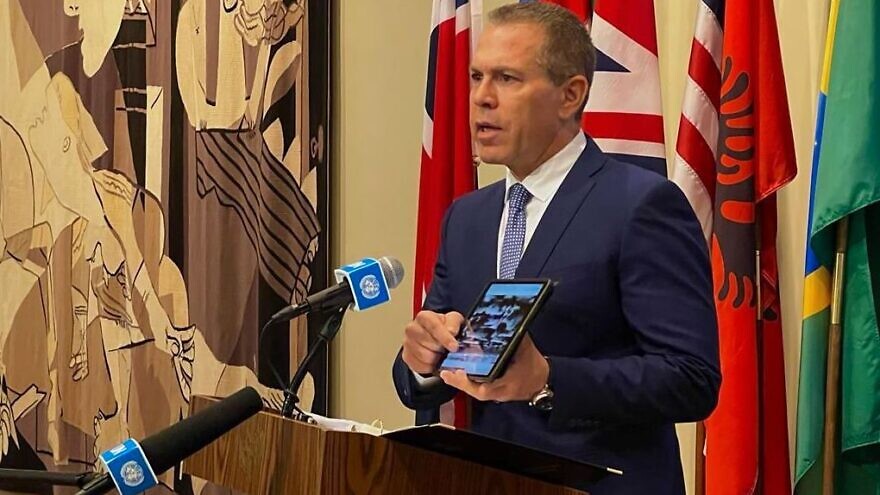Shortly after Cairo helped broker a ceasefire between Israel and Palestinian Islamic Jihad, an Egyptian diplomat let loose a barrage on Israel on the international stage.
At Monday afternoon’s emergency session at the U.N. Security Council, Egyptian Ambassador to the United Nations Osama Abdel Khalek surprisingly tore into Israel, hours after his Israeli counterpart praised Egypt for mediating a halt of violence.
The Israel Defense Forces estimates of the 46 Gazans killed, 11 were civilians caught up in Israeli airstrikes targeting PIJ combatants, while 16 Palestinians were killed by PIJ rockets.
Abdel Khalek also criticized Israel for allowing “settlers under the protection of the Israeli police to incur the courtyards of the Haram al-Sharif [Temple Mount].” He was referring to the more than 2,000 Jews who visited the Temple Mount for the Tisha B’Av on Sunday. Among Abdel Khalek’s other grievances, he claimed Israel “fully responsible” for “occupied” Gaza, despite Israel withdrawing from the territory in 2005, and as Egypt currently maintains a security blockade on Gaza similar to Israel’s.
Backlash from Russia, Ireland
Outside of the surprising outburst from Abdel Khalek, Israel largely avoided the usual heap of condemnation foisted upon it by the international community whenever it has conflict with its Palestinian neighbors. While the United Arab Emirates and China also criticized the ascension of a record number of Jews to the Temple Mount, Security Council members generally issued balanced, nuanced statements at worst, and in some cases, messages of support for Israel’s preemptive actions.
United States Ambassador to the United Nations Linda Thomas-Greenfield noted Washington “fully support[s] Israel’s right to defend its people against terrorist threats, including from rocket fire aimed at civilians or without regard to them.”
She castigated PIJ, a U.S.-designated terror group, as a proxy of Iran. “It is telling that Palestinian Islamic Jihad leaders were in Tehran the last several days while the people they claim to be protecting were left in harm’s way,” she said.
“This council should be able to come together and unconditionally repudiate the terrorism of Palestinian Islamic Jihad, whose reckless actions have put the lives of civilians, on both sides, at risk. Their actions must be condemned by all countries in no uncertain terms. And no country should be expected to tolerate or passively accept such brazen attacks on its civilians,” she said.
United Kingdom Ambassador James Kariuki expressed London’s condemnation for more than “1,100 rockets at civilians by Palestinian Islamic Jihad and the ongoing campaign of terror attacks by the group, which has resulted in the deaths of innocent civilians, Israelis and Palestinians alike.” He said the United Kingdom stands by Israel and “its right to defend itself in the face of such terrorism and violence.”
Ireland, which has long had an anti-Israel record at the world body, called the Israeli strikes “on civilians in the Gaza Strip unacceptable. … The impact on children, in an already difficult humanitarian situation, is especially worrying,” said Irish Ambassador Cáit Moran. Failing to mention PIJ by name, Moran said that Ireland condemned the firing of rockets from Gaza. “Attacks—and the threat of attacks—against Israeli citizens are unacceptable.”
And Russia, which has become increasingly hostile to Israel at the Security Council since Moscow’s invasion of Ukraine, said the weekend’s violence “spiral of escalation was provoked by strikes of Israeli air forces against Gaza.” Russian Ambassador to the United Nations Vassily Nebenzia also laid blame on America for failing to advance the peace-building efforts of the so-called Middle East Quartet, of which Russia is a member.
“Washington adopted a stance that erodes the internationally recognized basis for settlement and negotiations formats in the Middle East. This position does not facilitate de-escalation, but rather does the opposite,” said Nebenzia.
Egypt’s scolding notwithstanding, Israel largely seemed to benefit from an improved messaging apparatus, which was quick to release a video showing an errant PIJ rocket falling in a Gazan residential neighborhood, leading to the loss of life. Israel also disseminated an audio recording in which it called off a strike on a PIJ leader due to fears children could be in the area. Israel has historically fallen behind the media narrative in conflicts with Gazan terror groups, exposing itself to additional international scrutiny.
Erdan, who refused to comment on Abdel Khalek’s remarks, played those recordings for media gathered at the council, noting that nearly 20% of PIJ rockets landed in Gaza.
“These evil terrorists hide behind civilians to murder Israeli civilians and end up murdering Palestinian civilians along the way,” said Erdan. “How would Norway react to Islamists plotting to fire missiles at civilians in Oslo? How would Ireland react if jihadi rockets were raining down on Dublin in an effort to wipe out the ‘infidel?’ I think we all know the answer.”

























